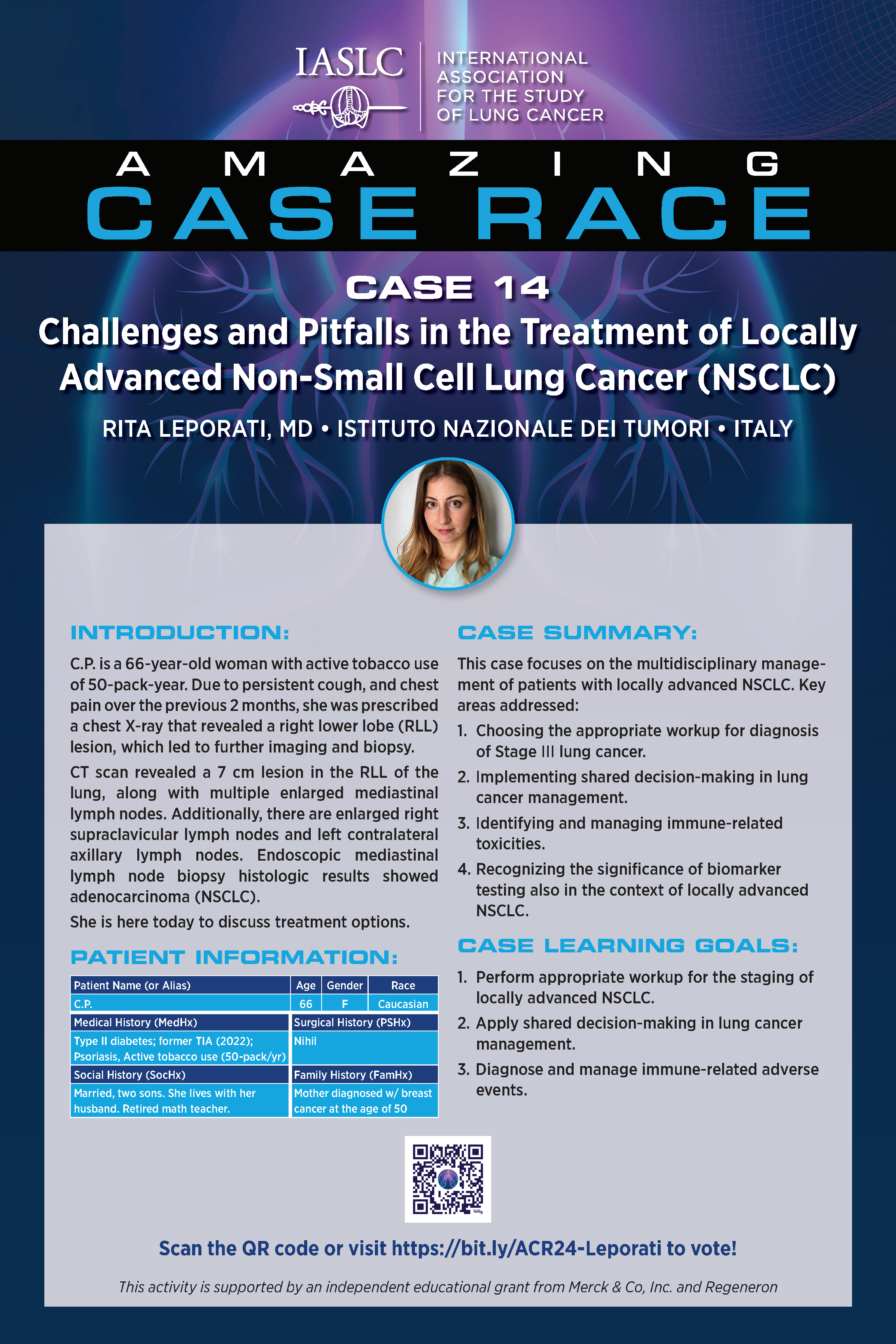
Why This Matters
This case study highlights the “Amazing Case Race” (ACR), a dynamic educational initiative developed by the International Association for the Study of Lung Cancer (IASLC). Designed to foster faculty development, gamify CME learning and increase global learner engagement, ACR is reshaping the way early-career clinicians experience professional growth. The program’s rapid success demonstrates how mentorship, innovation and interactivity can converge to build scalable, inclusive and impactful education.
Reimaging Mentorship Through CME Faculty Development
The ACR began as a creative offshoot of the IASLC Academy, a mentorship program, which annually brings together a global cohort of early-career thoracic oncology professionals. While the program already offered robust mentorship and networking, we saw an opportunity to give mentees a real-world faculty experience that extended beyond traditional didactic learning. The idea: Empower mentees to develop clinical case presentations and present them not in lecture halls, but in an interactive, conference-wide showcase that merged CME with competition.
Each mentee submits a clinical case reflective of current treatment standards, innovations or global challenges in lung cancer care. These cases are reviewed, transformed into professionally designed posters and displayed throughout the IASLC World Conference convention center. From there, the fun begins — attendees vote on their favorite cases via a digital ballot, and a live leaderboard captures the excitement in real time.
The top five cases are selected to form the foundation of a simulation-based course hosted on LungCancer 360, IASLC’s learning management system. All other cases are repurposed as interactive microlearning modules released throughout the year, ensuring that 100% of mentee submissions contribute to long-term CME programming.
What Makes the ACR Innovative?
- Gamified Learning that Energizes Engagement: Using public voting and live rankings, ACR injects fun and friendly competition into the educational experience — resulting in higher engagement across all learner types. ACR doesn’t just invite attendees to passively observe CME content; it challenges them to actively participate in selecting what matters most.
- Faculty Development for the Next Generation: By inviting mentees to create and present CME-level case studies, ACR bridges the gap between mentorship and faculty development. This experiential model gives early-career clinicians the tools, feedback and visibility needed to grow as future educators and leaders in the field.
- Global Relevance and Equity: Each year, the ACR reflects the geographic and clinical diversity of the academy cohort. Cases are designed to incorporate country-specific treatment access, regulatory frameworks and diagnostic limitations — offering a rare window into global lung cancer care disparities. This helps all learners better understand the nuances of delivering care across varied healthcare systems.
- Extended Educational Lifecycle: The ACR is not a one-and-done event. With top cases developed into immersive simulation courses and all others converted into microlearning content, the initiative provides ongoing educational value that extends far beyond the conference
Measurable Results and Impact
- In its inaugural year, the ACR engaged 6,000 learners at the IASLC World Conference and 231 learners on LungCancer 360, exceeding expectations across several outcome metrics, which were obtained through a post-activity evaluation survey and internal simulation data: 88% of learners reported the ACR met or exceeded their expectations.
- 82% found the instructional design conducive to learning.
- 100% agreed the activity was free from bias and impacted their knowledge.
- 76% reported increased competency.
- 71% noted improved clinical performance.
- 35% intended to apply new or different diagnostic strategies in practice.
In addition to these outcomes, the excitement surrounding ACR has grown exponentially. Mentees now proudly wear custom ACR T-shirts during the conference, additional signage boosts visibility and social media engagement has increased. The initiative has sparked curiosity and anticipation among both mentors and mentees, raising the profile of the entire mentorship program.
Fostering Community and Collaboration
One of the ACR’s defining characteristics is its ability to build community. Attendees are no longer just passive consumers of content — they are collaborators, voters and champions of their peers. The mentees themselves frequently partner on interdisciplinary case submissions, learning from one another while developing new skills in instructional design, presentation and clinical reasoning.
The visual presence of the ACR posters—strategically placed throughout the convention center—turns educational content into conversation starters. From informal debates to deeper dives during poster sessions, the ACR creates ongoing, peer-to-peer engagement that strengthens both educational value and professional networking.

Adapting to a Changing Clinical Landscape
The ACR is designed to evolve with the field of thoracic oncology. Because the clinical cases are created anew each year, the content is always aligned with the most current evidence, guidelines and real-world challenges. This ensures educational content stays relevant and responsive to new diagnostic tools, therapeutic options and care delivery models.
It also reflects the global variation in care. Mentees from across the world — representing high-, middle- and low-resource settings — submit cases that are true to their regional context, providing unique insights that aren’t typically captured in traditional CME programming.
Partners and Support
The success of the Amazing Case Race is made possible by grant support from industry partners and innovative learning technologies.
- In 2023, the ACR was funded by AbbVie and Janssen.
- In 2024, it was supported by Merck and Regeneron.
The simulation courses developed from the top-ranked cases utilize the Edocate simulation platform, enabling interactive, realistic clinical decision-making experiences for learners around the world.
These partnerships are instrumental in scaling the ACR and ensuring continued access to high-quality educational tools that benefit the global oncology community.
Sustaining the Momentum and Scaling Up
With growing interest and impact, the ACR is well-positioned for long-term sustainability. As the academy cohort continues to grow in size and diversity, so too does the quality and complexity of submitted cases. In 2025, IASLC is developing two simulation courses featuring the top 10 ACR cases — further extending the educational footprint and enabling deeper clinical engagement through immersive learning. As part of our scale-up strategy, we have also revamped the ACR content template to support multiple instructional designs, allowing the cases to be adapted and reused across various formats throughout the year. By continuing to innovate, expand visibility and align with IASLC’s global mission, the ACR is poised to become a flagship educational offering.
Key Takeaways and Lessons Learned
- Mentorship + CME = Faculty Development: Early-career professionals thrive when given meaningful, real-world opportunities to teach and create content.
- Gamification Works: Interactive learning models increase engagement, retention and enthusiasm — especially for conference-based education.
- Global Voices Matter: Including diverse clinical perspectives leads to richer, more inclusive educational content.
- Design for Reuse: Repurposing event-based content into long-term modules ensures educational sustainability and value.
As associations look to reinvent how they engage early-career professionals, the Amazing Case Race offers a replicable model for mentorship-based faculty development, learner engagement and scalable CME. It proves that educational innovation doesn’t require complex technology — just creativity, collaboration and a willingness to let learners lead.

Kelly Nevins-Kraines, director of education, IASLC, has over 28 years of experience in medical education. Throughout her career she has worked to create innovative live and enduring activities over a broad range of therapeutic categories and has strong experience with CME guidelines and instructional design.
Kelly is an active member of the continuing education community having served as the 2015-2016 president for the Illinois Alliance for CME (IACME) and on the IACME BOD for six years. She also lectures covering various CME topics for the ACCME, ACEHP, InformaConnect, European CME Forum and CMEPALOOZA, volunteers as an ACCME surveyor and has volunteered for various ACEHP committees.